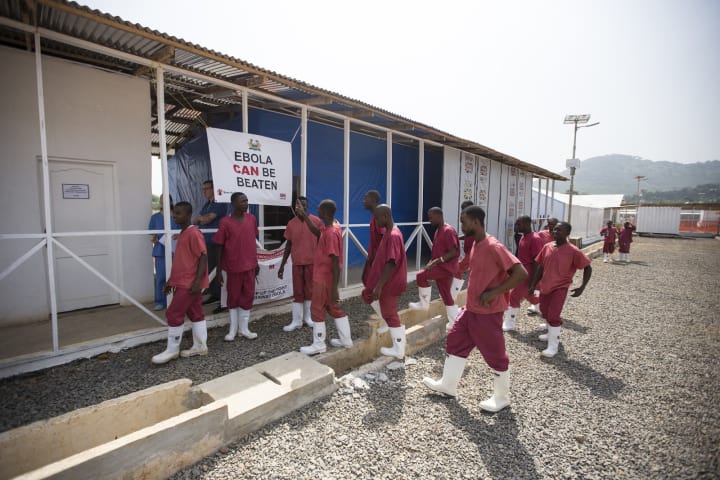
As a filmmaker, I never imagined that I would find myself trying to make sure my team didn’t get Ebola in the middle of a raging epidemic in Liberia. But that was where I found myself in the fall of 2014. We had started making our film “Unseen Enemy” about the 21st century threat of epidemics in 2013, before the Ebola epidemic, but suddenly we found ourselves right in the middle of the real thing. And these unexpected filming challenges didn’t end there. After we came back from West Africa there were the difficulties of filming in Asia and the U.S. around Influenza. And then there was Zika. Along the way, we had to develop some guidelines about what it meant to film during an epidemic.
This has become our rule book, both for how we work in the field together, and how we work and respect the people who agree to be in our films.
1. Safety matters. Having the right training before you go into an epidemic is critical. Our team underwent training with specialists before we went to West Africa and then received additional information on the ground. Safety matters for the team individually, but it is also our responsibility to not add to the disease burden in environments where there are limited resources. If someone on our team had gotten sick, they would likely have taken a bed away from a local who needed it.
2. What each of us did in the field had the potential to affect the entire group. That is essentially the lesson of an outbreak. Each member of the team is responsible for the health and safety of the entire crew. If you get sick, you have potentially made other people around you sick.
3. When you are dealing with death and illness — Influenza, Zika or Ebola — you have a profound obligation to make sure that you respect and honor each patient and their family. The patient in that bed could be you or someone you love. But our team worked tirelessly to always remember that every patient deserved respect and that any patient or family member who didn’t want to be filmed, who in anyway expressed hesitation, should not be filmed.
4. Sometimes, in difficult situations a leader needs to make decisions for the team. Twice, I had members of my crew say to me that their wife or mother had real concerns about them going to West Africa. In both cases the individuals ultimately said they wanted to go. Normally, I would have accepted their decision, but in this case, I decided for them. However small the risk, I didn’t want to be in a position of telling a wife or mother that the person they loved, who they hadn’t wanted to go, was sick. Sometimes a leader needs to make choices for other people.
5. When you go into an epidemic, you need great logistical producers both at home and in the field. On the ground, we had the fearless former Royal Marine Aldo Kane, whose sole job was to make sure that we followed the safety rules at all times. The longer you are in an environment, the easier it is to let your guard down, and Aldo was there to remind us to always spray our boots, wear gloves, done protective gear properly, take this gear off properly, and to follow distance rules. We also made an agreement not to work long hours, something that film crews often do. It is easier to get sick or make mistakes if you are tired, so we kept reasonable hours. At home, we had a wonderful lead producer, Rogger Lopez, who worked tirelessly to make sure we had insurance in place (as most carriers stopped insuring people) and he also made sure we had detailed evacuation plans.
6. When you are making a film in the middle of an epidemic, you are dealing with health care workers who are working under incredibly difficult circumstances. If you ask them for their time, you have an obligation to make sure that the time they give to you is well spent. Dr. Soka Moses, a young heroic Liberian doctor we profile in the film, initially didn’t want to be filmed. He wasn’t sure it would help the cause. I then had a series of conversations with him about the greater impact we could have around this issue. On my part, these conversations were a strong reminder of the obligations you have as a filmmaker when you take someone’s time, particularly in a challenging situation.
7. It is important to follow up with the people who let you into their world: a mom, a dad, a doctor, a nurse. Not only do the people you film deserve respect in the filming process, those who give of their time and hearts deserve to be kept informed about the film. They need to understand that what they did was valued, even if it didn’t make it into the final film.
8. Finally, making a good film takes an awful lot of time, money and passion. In our case, it took a huge village. But making a good film is only part of what you now need to do as a filmmaker. You also need to think about distribution and impact, because without a plan for targeted impact, you are creating something in a vacuum or preaching to the choir. Making a film requires you to develop a plan for how it will be seen by your target audience, just as discovering a drug requires you to think how that drug will get to people.
So that is the rule book we developed in making “Unseen Enemy.” I truly believe what we do is valuable. Story is how we all understand the world. Information is power, and during an epidemic, information and story play a key role in stopping an epidemic. I am privileged to be a filmmaker, but with that privilege comes obligation.
Unseen Enemy will air on CNN at 9:00 pm EST/7:00 pm PDT on Saturday, April 15.
Read more international development news online, and subscribe to The Development Newswire to receive the latest from the world’s leading donors and decision-makers — emailed to you free every business day.
